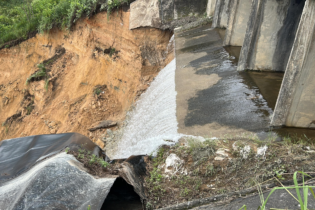CYRIL Gamede, the new CE of Umgeni Water, says there are enough engineers in South Africa and perceptions of shortages have arisen because employers do not want to train up newly qualified engineers.
Mr Gamede, who took up his position at South Africa’s second-biggest bulk water utility on August 20, is also the president of the Engineering Council of South Africa and was an operations director at Umgeni from 1996 to 2002. Umgeni’s main customer is eThekwini municipality, but it also supplies water to the north and south KwaZulu-Natal coastal regions and to Msunduzi municipality. It supplies 426-million cubic metres of potable water to six municipal customers and is about a third the size of South Africa’s biggest water utility, Rand Water. Umgeni has a programme of providing experience for newly qualified engineers by letting them work on the utility’s capital projects. Mr Gamede says its core goal is to supply water at an affordable tariff and to meet the challenges of people who do not have access to water and who cannot pay for it. “You are forced to cross-subsidise. It is always a contentious issue because some customers are happy to receive a lower tariff while others do not wish to pay more,” says Mr Gamede. Much of his new job involves negotiating with customers because steady income is essential if Umgeni is to continue providing bulk infrastructure, he says. Fortunately, the municipalities “have a good track record” with Umgeni and it continued to be paid even when Msunduzi municipality was under administration, he says. One of the reasons Umgeni needs to maintain a solid financial structure is because it taps markets for capital and needs to maintain a good market rating — Fitch has a AA+ long-term rating on Umgeni and a F1+ rating over the short term. The favourable ratings indicate a strong capacity to meet financial commitments.Mr Gamede says one of the challenges facing Umgeni is to provide enough water to Ilembe District on the north coast, one of the fastest growing areas in South Africa as commerce and industry move northwards out of Durban.
There have been water shortages in Ballito, a town with strong tourism growth, over the December holidays, while businessmen in the area claim development is being hampered by the lack of water and electricity. Mr Gamede says a feasibility study has been done for a regional bulk water scheme for Ilembe, and the project will probably be concluded in three years. In the meantime, “augmentation projects” are being undertaken to ensure there is enough water until the larger scheme is commissioned. Umgeni plans to spend about R4.4bn on capital projects over the next five years, about R2.1bn of which will go towards bulk rural systems. The utility will get as much grant funding as it can for the infrastructure in rural areas, he says. Mr Gamede sees opportunities for Umgeni to assist with the water reticulation developments of some municipalities, and in that way to help those local authorities obtain the Blue Drop award. To receive a Blue Drop award a water system must have scored 95% or higher when assessed by the Department of Water Affairs against the Blue Drop requirements. These look beyond the quality of drinking water to the overall management of the drinking water system.
Photo: Umgeni Water CE Cyril Gamede Source: bdlive.co.za





